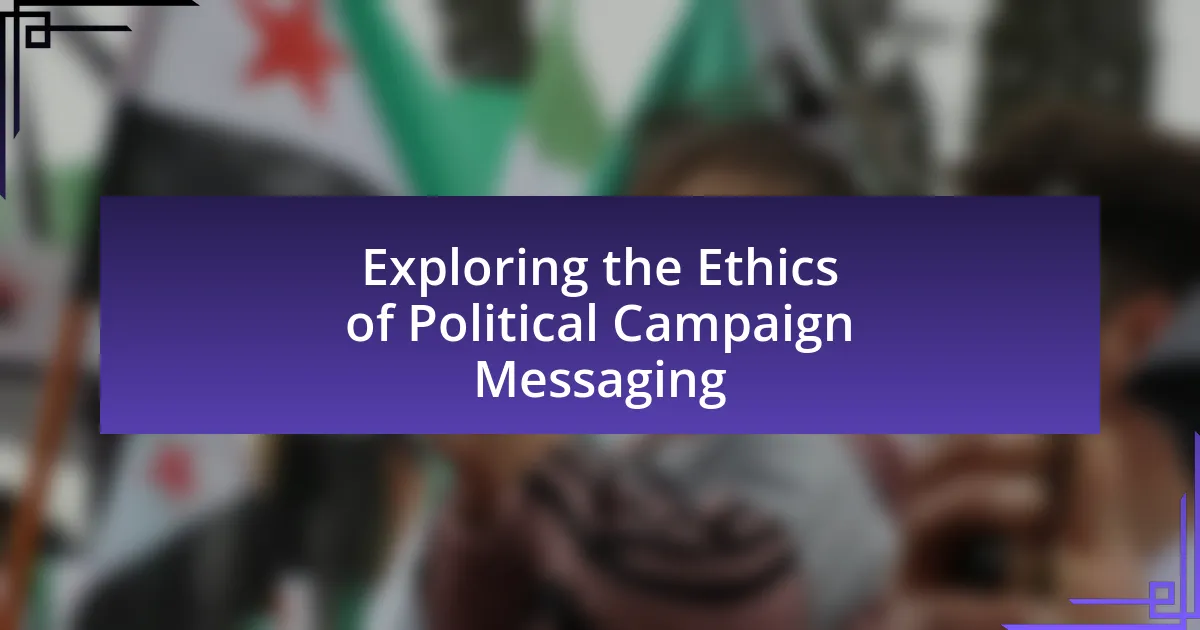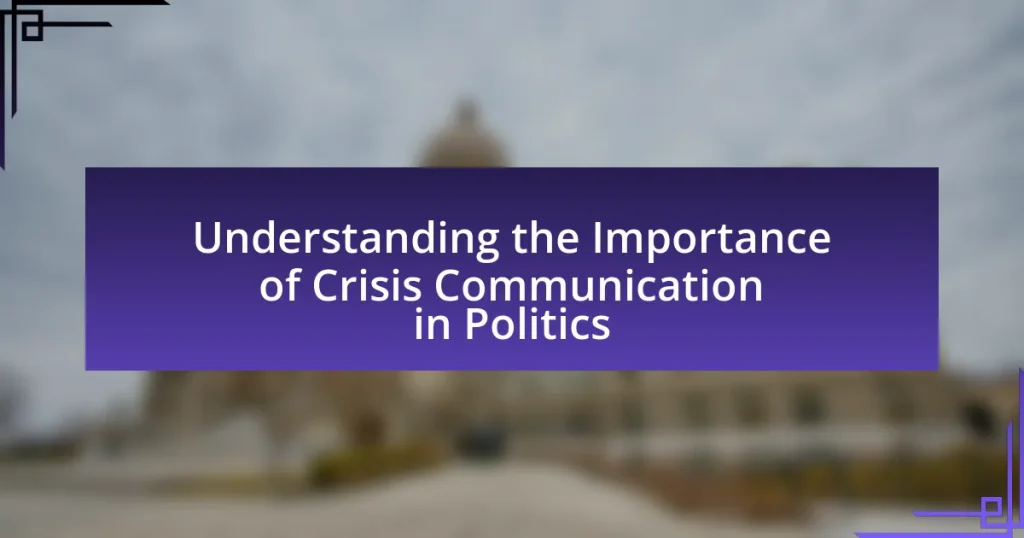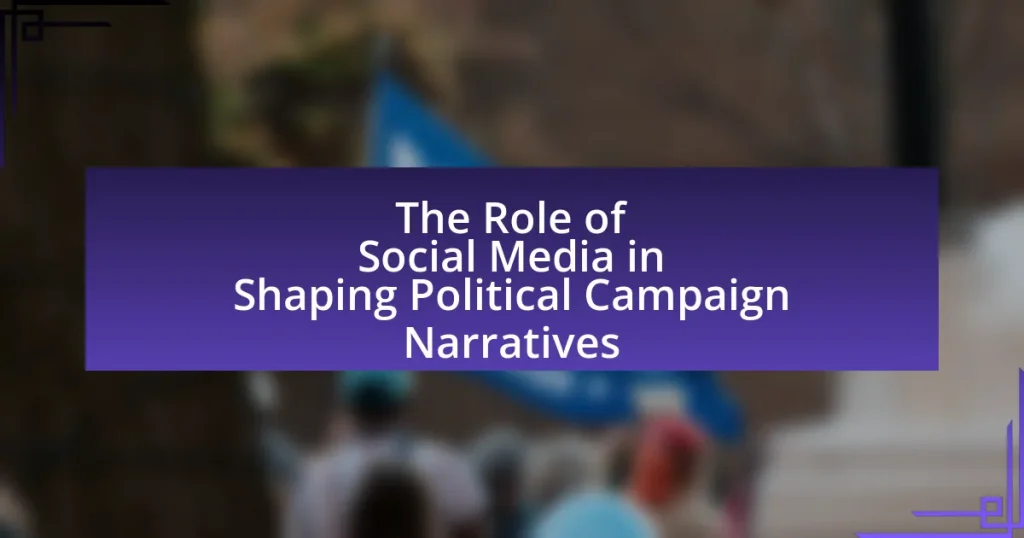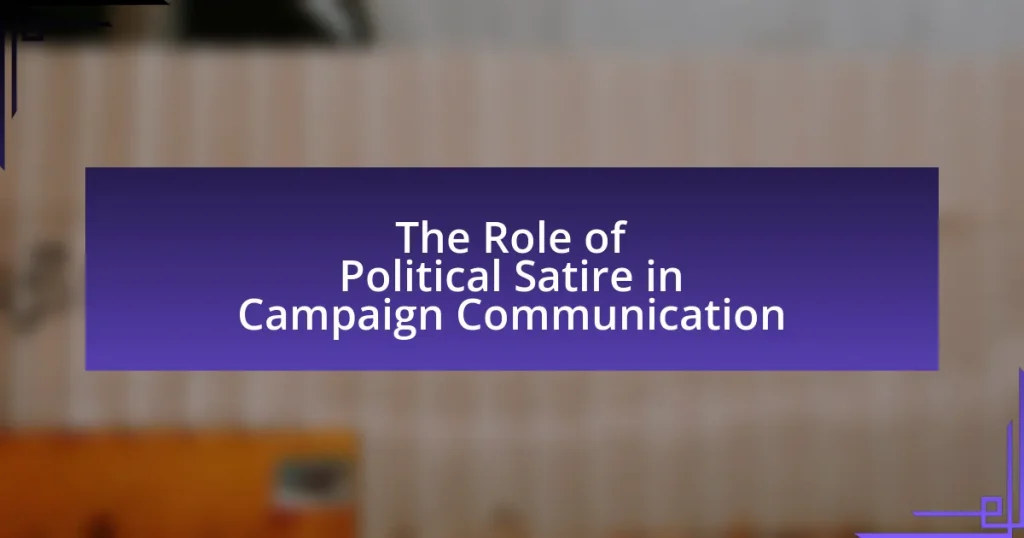The article “Exploring the Ethics of Political Campaign Messaging” examines the ethical considerations that underpin political communication, emphasizing principles such as honesty, transparency, respect, and accountability. It discusses how these ethical standards influence political messaging across various campaign types, highlighting the importance of avoiding misinformation and negative campaigning, which can erode public trust and voter engagement. Additionally, the article outlines the legal boundaries governing political messaging and offers practical tips for campaigns to ensure ethical communication, including the use of technology and audience engagement strategies. Overall, it underscores the critical role of ethical practices in fostering a healthy democratic process.
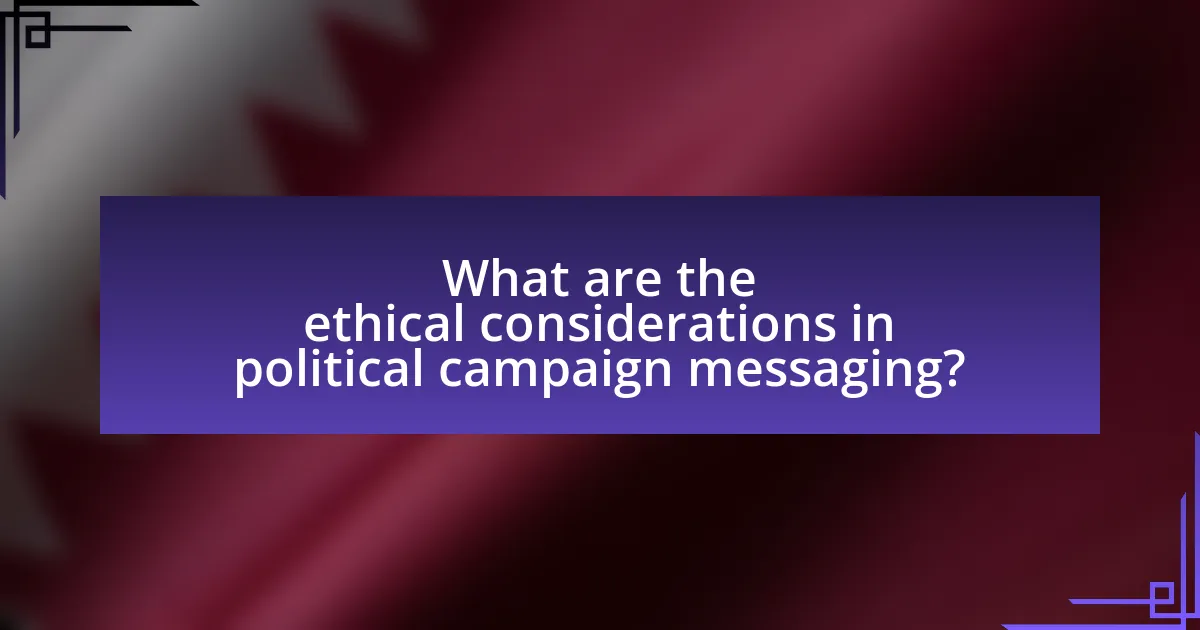
What are the ethical considerations in political campaign messaging?
Ethical considerations in political campaign messaging include honesty, transparency, and respect for the audience. Campaigns must avoid misleading information, as studies show that deceptive messaging can erode public trust and undermine democratic processes. For instance, the American Psychological Association highlights that misinformation can lead to voter disenfranchisement and polarization. Additionally, campaigns should respect the dignity of individuals and groups, avoiding hate speech or discriminatory language, which can perpetuate social divisions. Ethical messaging fosters informed decision-making among voters, contributing to a healthier political environment.
How do ethical standards influence political communication?
Ethical standards significantly influence political communication by establishing guidelines that govern the behavior of political actors and the information they disseminate. These standards promote transparency, honesty, and accountability, which are essential for maintaining public trust. For instance, adherence to ethical standards can prevent the spread of misinformation, as seen in various political campaigns where candidates who prioritize ethical communication tend to engage in fact-checking and provide accurate information to their constituents. Research indicates that ethical political communication fosters a more informed electorate, which is crucial for the functioning of a healthy democracy.
What are the key ethical principles in political messaging?
The key ethical principles in political messaging include honesty, transparency, respect, and accountability. Honesty requires that political messages accurately represent facts and avoid misleading information, as demonstrated by the ethical guidelines established by organizations like the American Association of Political Consultants. Transparency involves disclosing the sources of funding and the intent behind messages, which is crucial for maintaining public trust. Respect entails acknowledging the diverse perspectives of the electorate and avoiding derogatory language or personal attacks. Accountability means that political actors should be responsible for the content they disseminate and be willing to correct misinformation. These principles are essential for fostering a healthy democratic process and ensuring informed voter decision-making.
How do these principles apply to different types of campaigns?
The principles of ethical political campaign messaging apply differently across various types of campaigns, such as local, state, and national elections. In local campaigns, candidates often emphasize community engagement and transparency, as these factors foster trust and accountability among constituents. For instance, a study by the Pew Research Center found that 70% of voters value honesty in local candidates, indicating that ethical messaging can significantly influence voter perception and behavior.
In state campaigns, the principles shift towards addressing broader policy issues while maintaining integrity in communication. Candidates are expected to provide clear, factual information about their positions, as evidenced by the National Association of Secretaries of State, which reported that misinformation can lead to voter disenfranchisement.
National campaigns, on the other hand, often involve more complex messaging strategies, where ethical principles must navigate the influence of media and political action committees. The Federal Election Commission highlights the importance of transparency in campaign financing, as ethical breaches in this area can lead to public distrust and regulatory consequences.
Overall, while the core ethical principles remain consistent—truthfulness, transparency, and accountability—their application varies based on the campaign’s scale and context, impacting voter engagement and trust.
Why is transparency important in political messaging?
Transparency is crucial in political messaging because it fosters trust between politicians and the electorate. When political messages are clear and honest, voters can make informed decisions based on accurate information. Research indicates that transparency in political communication can lead to higher voter engagement and participation, as seen in studies conducted by the Pew Research Center, which found that 70% of voters value honesty in political messaging. Furthermore, transparency helps to reduce misinformation and promotes accountability, ensuring that politicians are held responsible for their statements and actions.
What role does honesty play in voter trust?
Honesty is fundamental to establishing and maintaining voter trust. When political candidates communicate transparently and truthfully, they foster a sense of reliability and credibility among the electorate. Research indicates that voters are more likely to support candidates who demonstrate integrity, as evidenced by a 2020 study published in the Journal of Political Marketing, which found that 78% of respondents prioritized honesty in their voting decisions. This correlation underscores that perceived honesty directly influences voter confidence and engagement in the democratic process.
How can misleading information impact electoral outcomes?
Misleading information can significantly alter electoral outcomes by shaping voter perceptions and decisions based on false narratives. For instance, during the 2016 U.S. presidential election, studies indicated that misinformation spread through social media influenced public opinion, leading to a measurable impact on voter behavior. Research from the Pew Research Center found that 64% of Americans believed fabricated news stories confused them about basic facts regarding candidates and issues, ultimately affecting their voting choices. This demonstrates that misleading information can distort the electoral process by creating an environment where voters make decisions based on inaccuracies rather than factual information.
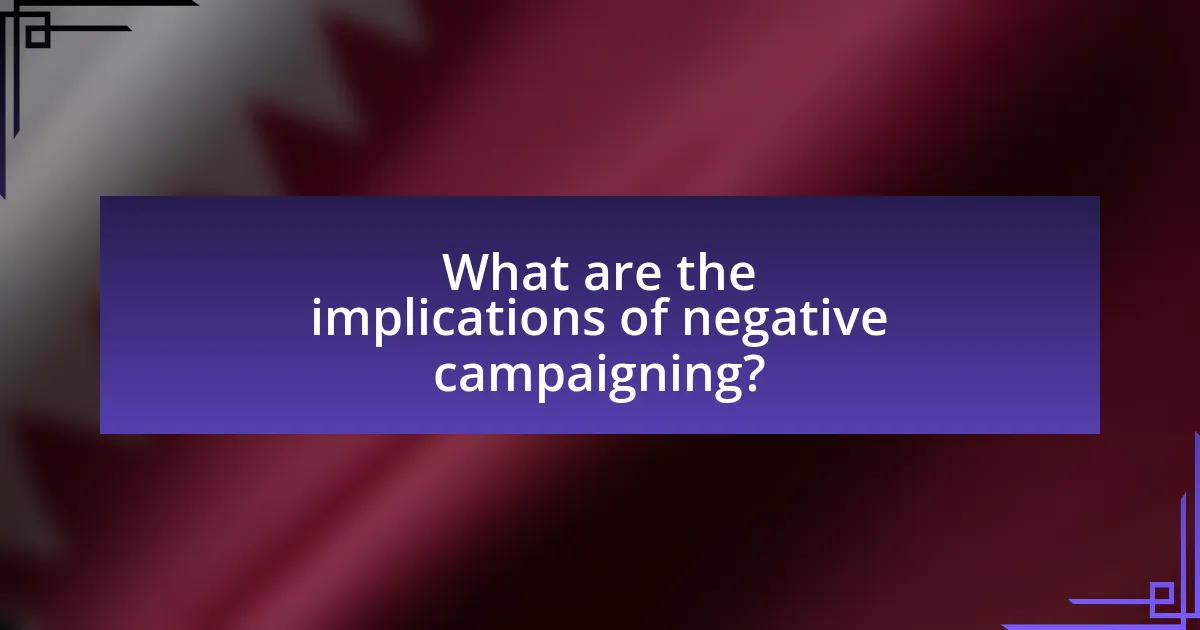
What are the implications of negative campaigning?
Negative campaigning can lead to increased voter cynicism and disengagement from the political process. Research indicates that when campaigns focus on attacking opponents rather than promoting their own policies, it can foster distrust in political institutions and diminish overall voter turnout. For instance, a study by the Pew Research Center found that negative ads can contribute to a perception that all candidates are untrustworthy, which may discourage participation in elections. Additionally, negative campaigning can polarize the electorate, creating deeper divisions among voters and reinforcing partisan biases. This polarization can hinder constructive political discourse and compromise, ultimately affecting governance and policy-making.
How does negative messaging affect public perception?
Negative messaging significantly alters public perception by fostering distrust and reinforcing negative stereotypes. Research indicates that exposure to negative political advertisements can lead to increased cynicism towards candidates and the political process, as evidenced by a study published in the Journal of Politics, which found that negative ads can decrease voter turnout by up to 10%. This decline in engagement stems from the perception that all candidates are untrustworthy, ultimately shaping a more polarized electorate.
What psychological effects does negative campaigning have on voters?
Negative campaigning significantly impacts voters by inducing feelings of fear, anxiety, and distrust. Research indicates that exposure to negative political ads can lead to increased voter cynicism and decreased political efficacy, making individuals feel that their participation in the electoral process is futile. A study by Lau and Pomper (2004) found that negative campaigning can mobilize voters by heightening their emotional responses, but it can also alienate them from the political system. Furthermore, negative messages often reinforce existing biases, leading to polarized opinions and a lack of constructive dialogue among voters.
How can negative campaigning backfire on candidates?
Negative campaigning can backfire on candidates by alienating voters and damaging their own reputation. When candidates engage in negative tactics, they risk being perceived as untrustworthy or desperate, which can lead to a loss of support. For instance, a study by the American Political Science Review found that negative ads can lead to increased voter turnout for the opposing candidate, as voters may rally against perceived unfairness. Additionally, negative campaigning can create a backlash effect, where voters become more sympathetic to the targeted candidate, ultimately strengthening their position.
What are the legal boundaries of political messaging?
The legal boundaries of political messaging are defined by laws that regulate campaign finance, false statements, and electioneering communications. In the United States, the Federal Election Commission (FEC) enforces regulations that prohibit the use of corporate funds for political messaging and require disclosure of funding sources. Additionally, laws against defamation and false advertising apply to political messaging, ensuring that candidates cannot make misleading claims about their opponents. For instance, the Bipartisan Campaign Reform Act of 2002 restricts certain types of political advertisements and mandates transparency in funding. These legal frameworks aim to maintain fair electoral processes and protect voters from deceptive practices.
What laws govern political advertising and messaging?
Laws governing political advertising and messaging primarily include the Federal Election Commission (FEC) regulations, which enforce the Federal Election Campaign Act (FECA). These laws require transparency in campaign financing, mandating that candidates and political committees disclose their contributions and expenditures. Additionally, the Bipartisan Campaign Reform Act (BCRA) restricts the use of soft money in federal elections and regulates issue advocacy ads. State laws also play a significant role, as many states have their own regulations regarding campaign advertising, including disclosure requirements and limits on contributions. These laws collectively aim to ensure fair practices and transparency in political communication.
How do these laws vary across different jurisdictions?
Laws governing political campaign messaging vary significantly across jurisdictions, reflecting differences in legal frameworks, cultural values, and political systems. For example, in the United States, campaign finance laws are regulated by the Federal Election Commission, which imposes limits on contributions and requires disclosure of funding sources, while states may have additional regulations that can differ widely. In contrast, countries like Canada have stricter rules regarding advertising content and spending limits during election periods, enforced by Elections Canada. These variations are influenced by historical contexts, such as the U.S. Supreme Court’s ruling in Citizens United v. FEC, which expanded the scope of political spending as a form of free speech, leading to a more permissive environment for campaign financing compared to jurisdictions with more restrictive approaches.
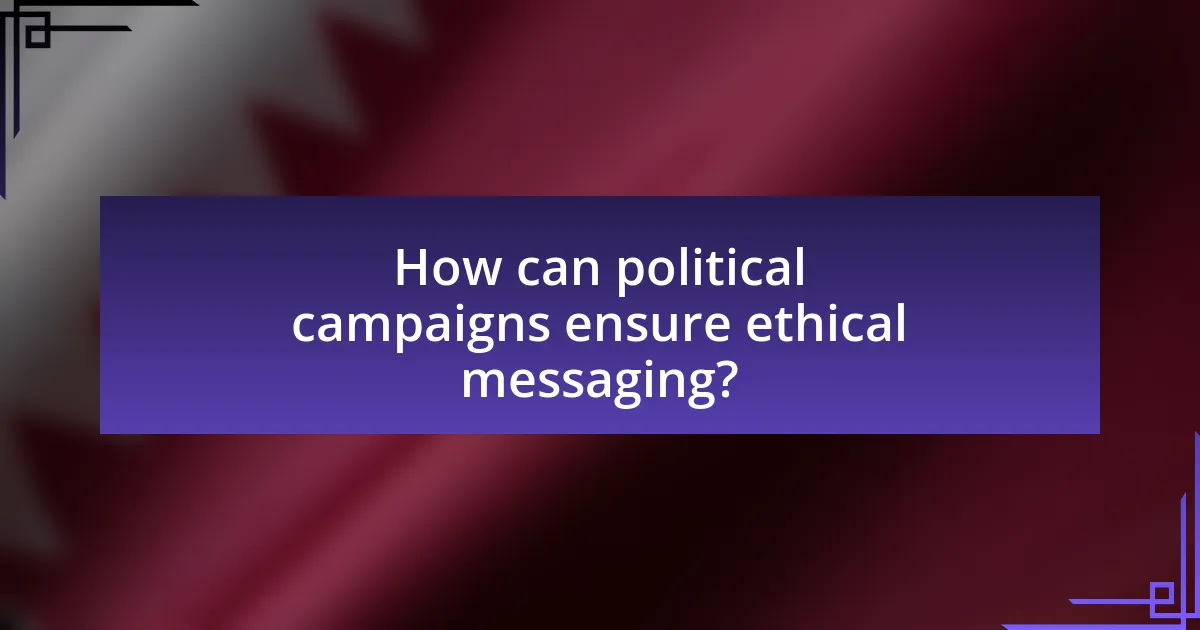
How can political campaigns ensure ethical messaging?
Political campaigns can ensure ethical messaging by adhering to transparency, honesty, and respect for opponents. Transparency involves clearly disclosing funding sources and affiliations, which builds trust with voters. Honesty requires campaigns to avoid misleading statements and fact-check their claims, as evidenced by the fact that campaigns that provide accurate information tend to foster greater public confidence, according to a study by the Pew Research Center. Respect for opponents includes refraining from personal attacks and focusing on policy differences, which promotes a healthier political discourse. By implementing these practices, campaigns can maintain ethical standards in their messaging.
What best practices should campaigns follow for ethical communication?
Campaigns should prioritize transparency, honesty, and respect for the audience in their communication practices. Transparency involves clearly disclosing funding sources and affiliations, which builds trust and credibility. Honesty requires presenting information accurately without misleading statements or exaggerations, as evidenced by the American Association of Political Consultants’ Code of Ethics, which emphasizes truthfulness in messaging. Respect for the audience entails acknowledging diverse perspectives and avoiding divisive or inflammatory rhetoric, fostering a more inclusive dialogue. These best practices not only enhance the integrity of the campaign but also contribute to a healthier democratic process.
How can campaigns effectively fact-check their messages?
Campaigns can effectively fact-check their messages by implementing a systematic approach that includes verifying information through credible sources, utilizing fact-checking organizations, and establishing internal review processes. For instance, campaigns should cross-reference claims with reputable databases such as PolitiFact or FactCheck.org, which provide assessments of political statements. Additionally, employing trained staff or volunteers to scrutinize messaging against verified data can enhance accuracy. Research indicates that campaigns that prioritize fact-checking not only improve their credibility but also foster trust among constituents, as demonstrated by a study from the Pew Research Center showing that voters value transparency and accuracy in political communication.
What role does audience engagement play in ethical messaging?
Audience engagement is crucial in ethical messaging as it fosters transparency and accountability in communication. Engaging the audience allows for a two-way dialogue, enabling the dissemination of accurate information and the addressing of concerns, which is essential in maintaining trust. Research indicates that campaigns that actively involve their audience in discussions are more likely to adhere to ethical standards, as they are held accountable by the public. For instance, a study by the Pew Research Center found that 70% of voters prefer candidates who engage with them directly, reflecting a demand for ethical practices in political messaging. This engagement not only enhances the credibility of the message but also empowers the audience to make informed decisions, reinforcing the ethical responsibility of communicators in political contexts.
What tools and resources are available for ethical campaign messaging?
Ethical campaign messaging can be supported by various tools and resources, including guidelines from organizations like the American Association of Political Consultants, which provides ethical standards for campaign professionals. Additionally, software tools such as NationBuilder and Mailchimp offer features that help ensure transparency and compliance with ethical standards in messaging. Research from the Pew Research Center indicates that voters value honesty and transparency, reinforcing the importance of using these tools to maintain ethical communication. Furthermore, resources like the Center for Political Accountability provide frameworks for ethical practices in campaign finance, which directly impact messaging strategies.
How can technology assist in promoting ethical standards in campaigns?
Technology can assist in promoting ethical standards in campaigns by enabling transparency and accountability through data analytics and digital platforms. For instance, campaign management software can track and report on campaign spending, ensuring compliance with legal regulations and ethical guidelines. Additionally, social media platforms can facilitate real-time communication with voters, allowing for immediate feedback and correction of misinformation, which enhances the integrity of the campaign message. Research indicates that campaigns utilizing data-driven strategies are more likely to adhere to ethical standards, as they can monitor public sentiment and adjust their messaging accordingly to avoid misleading claims.
What organizations provide guidance on ethical political messaging?
Organizations that provide guidance on ethical political messaging include the American Association of Political Consultants (AAPC), which promotes ethical standards in political consulting, and the National Democratic Institute (NDI), which offers resources on ethical campaigning practices. Additionally, the International Republican Institute (IRI) provides guidelines for ethical political communication. These organizations emphasize transparency, honesty, and accountability in political messaging, ensuring that campaigns adhere to ethical norms and foster public trust.
What are the future trends in ethical political campaign messaging?
Future trends in ethical political campaign messaging will increasingly focus on transparency, authenticity, and the use of data-driven strategies that prioritize voter engagement. As voters demand more accountability, campaigns will likely adopt clearer communication about funding sources and the motivations behind their messages. Additionally, the rise of social media and digital platforms will push campaigns to create more personalized and relatable content, fostering genuine connections with constituents. Research indicates that campaigns employing authentic storytelling and community involvement see higher engagement rates, reinforcing the importance of these trends in shaping future messaging strategies.
How might social media influence the ethics of political messaging?
Social media significantly influences the ethics of political messaging by enabling rapid dissemination of information, which can lead to the spread of misinformation and manipulation of public opinion. The immediacy and reach of platforms like Twitter and Facebook allow political messages to go viral, often without fact-checking, which raises ethical concerns about the accuracy and integrity of the information shared. For instance, a study by the Pew Research Center found that 64% of Americans believe that social media has a mostly negative effect on the way things are going in the country today, highlighting concerns over the ethical implications of political messaging in these spaces. Additionally, algorithms that prioritize engagement can amplify sensational or misleading content, further complicating the ethical landscape of political communication.
What emerging challenges do campaigns face regarding ethical communication?
Campaigns face several emerging challenges regarding ethical communication, primarily due to the rise of misinformation and the rapid evolution of digital media. Misinformation can distort public perception and undermine trust, as seen in the 2016 U.S. presidential election, where false narratives spread widely on social media platforms. Additionally, the use of targeted advertising raises ethical concerns about privacy and manipulation, as campaigns can exploit personal data to influence voter behavior without transparency. These challenges necessitate a reevaluation of ethical standards in political communication to ensure integrity and accountability.
What practical tips can campaigns implement for ethical messaging?
Campaigns can implement ethical messaging by ensuring transparency, accuracy, and respect for diverse perspectives. Transparency involves clearly disclosing funding sources and affiliations, which builds trust with the audience. Accuracy requires campaigns to fact-check all claims, as misinformation can lead to public distrust; for instance, a study by the Pew Research Center found that 64% of Americans believe fabricated news stories cause confusion about basic facts. Respecting diverse perspectives means avoiding divisive language and promoting inclusivity, which can enhance community engagement and foster a more constructive political dialogue.
